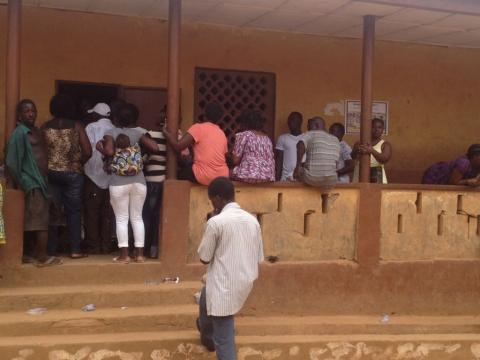By Mohamed Massaquoi
Sierra Leone’s much anticipated nationwide voter registration started on Monday amidst complaints of delay at registration centres and chaotic scenes blamed on insufficient and faulty equipment.
In some cases registration officials also attributed the slowness of the exercise to the “poor sensitisation” of the public.
Some impatient registrants abandoned registration centres after standing in long queues for long hours.
The four-week -long exercise is the first phase of a nationwide civil registration being conducted by the government, and has been infused to the electoral calendar.
The National Electoral Commission (NEC) says 3,300 registration centres have been erected across the country, and that they are working with the support of the National Civil Registration Authority.
There were reports of registration centres opening late in remote and riverine parts of the country, such as in Bonthe District, which has been blamed on tough terrain. But in Freetown, where Politico visited a few centres, the concern was around equipment and knowledge of the essence of the exercise.
In Congo Town in the west end of Freetown, for example, people complained of slow registration process, a situation an official linked to poor sensitisation.
“We are faced with so many challenges because of little sensitisation by the National Electoral Commission or whoever is responsible,” said Emiric Samuel, Assistant Registration Officer in Constituency 129.
He said that due to poor sensitisation, communication with registrants was slow and that many people came to the centre without the required document of proof of citizenship, like birth certificate, national ID card, passport or naturalisation certificate.
According to NEC, the alternative to the unavailability of these documents mentioned above is for registrants to present witnesses in the form of reputable people such as religious leaders, councillors, tribal authorities and heads of academic institutions, to attest to their citizenship status.
A Politico reporter witnessed a batch of about five women abandoning the centre and leaving as they complained about the “slow” process. They were mostly petty traders who had hoped to leave the centre early to do their trade.
Kalilu Salso feared that at the current pace, a lot more people would be prevented from registering. He called for the “urgent attention” of the relevant authorities.
Salso, who arrived at 8am at the centre, an hour before the exercise was to commence, spent three hours waiting to be attended to. He said that by 11am not even 10 people had registered.
“I only managed to stay because of my level of education, knowing very well the importance of such a process,” he said.
He also observed the potential for chaos with some people jumping the queue and no security guards to ensure order. He urged NEC to make available at least three more sets of registration machines if they were to meet the demands at the centre.
Edmond Jaret, the political party agent for the ruling All People’s Congress, observed that the process was slow partly because many of the people were old and had difficulty understanding the requirements.
“The [registration] officials have to spend more than 30 minutes dealing with each and every one of them as a result of their slow response to answering questions,” Jaret said.
Meanwhile, President Ernest Bai Koroma has urged citizens to make it a point of duty to go out and register. He and the First Lady registered at the Goodrich Community Primary School, near their private residence.
Speaking to journalists shortly after going through the process, Koroma said it was necessary for people to do so to make them eligible to vote on election day on 7 march 2018, saying that the process wasn’t just about election, but also important for lifelong personal development.
Copyright © Politico 2017








